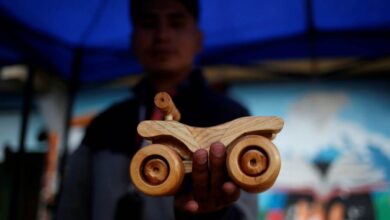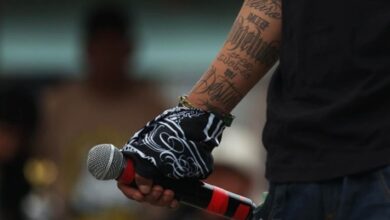Jeanine Áñez, political revenge or justice?
The decision of a judge to order four months of preventive detention for the former Bolivian president has altered the political landscape of the Andean country and the region .

The former president of Bolivia is held in La Paz where she will remain for four months until her judicial future is resolved. Photo: Voice of America
LatinAmerican Post | Nelson Andrés Tamayo Gaviria
Listen to this article
Leer en español: Caso Jeanine Áñez, ¿venganza política o justicia?
Jeanine Áñez left the interim presidency of Bolivia in November 2020, but for a week (March 13), she has been held in La Paz where she will remain for four months until her judicial future is resolved. The Prosecutor's Office and the Government accuse her of sedition and terrorism, among other charges, in the so-called “coup d'état case”.
Áñez was transferred to the Obrajes Female Orientation Center on Monday; former ministers Álvaro Coímbra (Justice) and Rodrigo Guzmán (Energy), who were part of her interim cabinet, have also been sent to detention centers where they will spend the next few months.
The ex-president has spoken before various media where she has expressed her innocence and has requested the intervention of international organizations. In addition, she accuses the ruling party, MAS (Movement to Socialism) and the current president, Luis Arce, of undertaking a "political persecution" against her.
Denuncio ante Bolivia y el mundo, que en un acto de abuso y persecución política el gobierno del MAS me ha mandado arrestar. Me acusa de haber participado en un golpe de estado que nunca ocurrió. Mis oraciones por Bolivia y por todos los bolvianos.
— Jeanine Añez Chavez (@JeanineAnez) March 13, 2021
An extensive trial
In her initial statements, Áñez complained about the conditions of her capture, arguing that she has special protection for having held the presidency, "I have privileges (jurisdiction) and would have to be accused in a court case." However, the Prosecutor's Office assures that they are trying her for crimes that she would have committed during her last days as a senator, on election day 2019.
CASO “GOLPE DE ESTADO”: FISCALÍA GARANTIZA INVESTIGACIÓN TRANSPARENTE, OBJETIVA E IMPARCIAL#FiscalíaGeneralDelEstadohttps://t.co/LMQXZm7gQI pic.twitter.com/Do6F9E8YeN
— Fiscalía de Bolivia (@FGE_Bolivia) March 16, 2021
The Minister of Justice, Iván Lima, said that “what we are looking for is not a four-month detention, what we are looking for is a 30-year sentence because here there have been bloody massacres , here there have been families who have been left without parents, mothers who have been left without children ”. Referring to the events that occurred in the towns of Sacaba and Senkata, in which the forces of order attacked MAS protesters, events condemned by the IACHR in December 2019 .
Also read: Chamber saves Paraguayan president from impeachment and tension between Moscow and Washington
Ariel Colorado, lawyer for the former Head of State, has denounced irregularities in the process and lack of evidence, also stated that "the Prosecutor's Office intends to accuse the former president with actions of third parties" and that this entity presented an accusation that does not include any concise evidence . Colorado also said that Áñez was legally sworn in as president, by a decision of the Plurinational Constitutional Court of Bolivia and not by any coup d'état; theses that have been supported by various international organizations, including Human Rights Watch.
#Bolivia-Manifestaciones en Santa Cruz bolivia en contra de la detencion de la ex-presidenta @JeanineAnez y sus ministros. pic.twitter.com/7fwrWdYxJL
— DATOS (@Datoworld) March 15, 2021
The regional impact
In Latin America, various leaders and organizations have expressed their opinion on the events in Bolivia, the role of the OAS and its Secretary General, Luis Almagro, has been key and is causing mutual attacks between the Bolivian government and that multilateral organization. The OAS published a statement and asked Bolivia to allow a commission to "investigate acts of corruption (…) in the government of former President Evo Morales."
Comunicado de la Secretaría General de la @OEA_oficial sobre la situación en #Bolivia https://t.co/wdyN5ZryvI pic.twitter.com/2AnROgk7Ti
— Luis Almagro (@Almagro_OEA2015) March 15, 2021
For his part, the Argentine president, Alberto Fernández, stated in a television program that "Evo Morales suffered a coup d'etat" and that he has "no doubt that the OAS was involved and that, if Almagro had dignity, he should step aside ”.
The Secretary-General of the United Nations, Antonio Guterres, made a statement in which he reminded Bolivia "to respect the guarantees of due process and total transparency in all judicial procedures." In addition, José Miguel Vivanco, director of Human Rights Watch for the Americas, insisted that the arrest warrants against Jeanine Áñez and her former ministers do not include evidence of the crime of terrorism.
En el gob. de Áñez hubo graves violaciones de DDHH, incluyendo dos aberrantes masacres. Deben ser investigadas seriamente con pleno respeto al debido proceso.
La orden de detención contra Áñez no se refiere a esas masacres sino que la acusa de “terrorismo” sin aportar pruebas.
— José Miguel Vivanco (@JMVivancoHRW) March 13, 2021
In any case, Bolivia is just beginning to see the consequences of the Áñez case. President Luis Arce has been in government for a short time and already has the risk of being isolated in the region. The treatment of his officials towards opponents in the future will not be ignored by the international community or by the main global organizations.
Now, if Bolivian justice manages to find the necessary evidence to convict the former president, her political career could be over and the specter of the “coup” will continue to haunt the country and the region for a long time.




